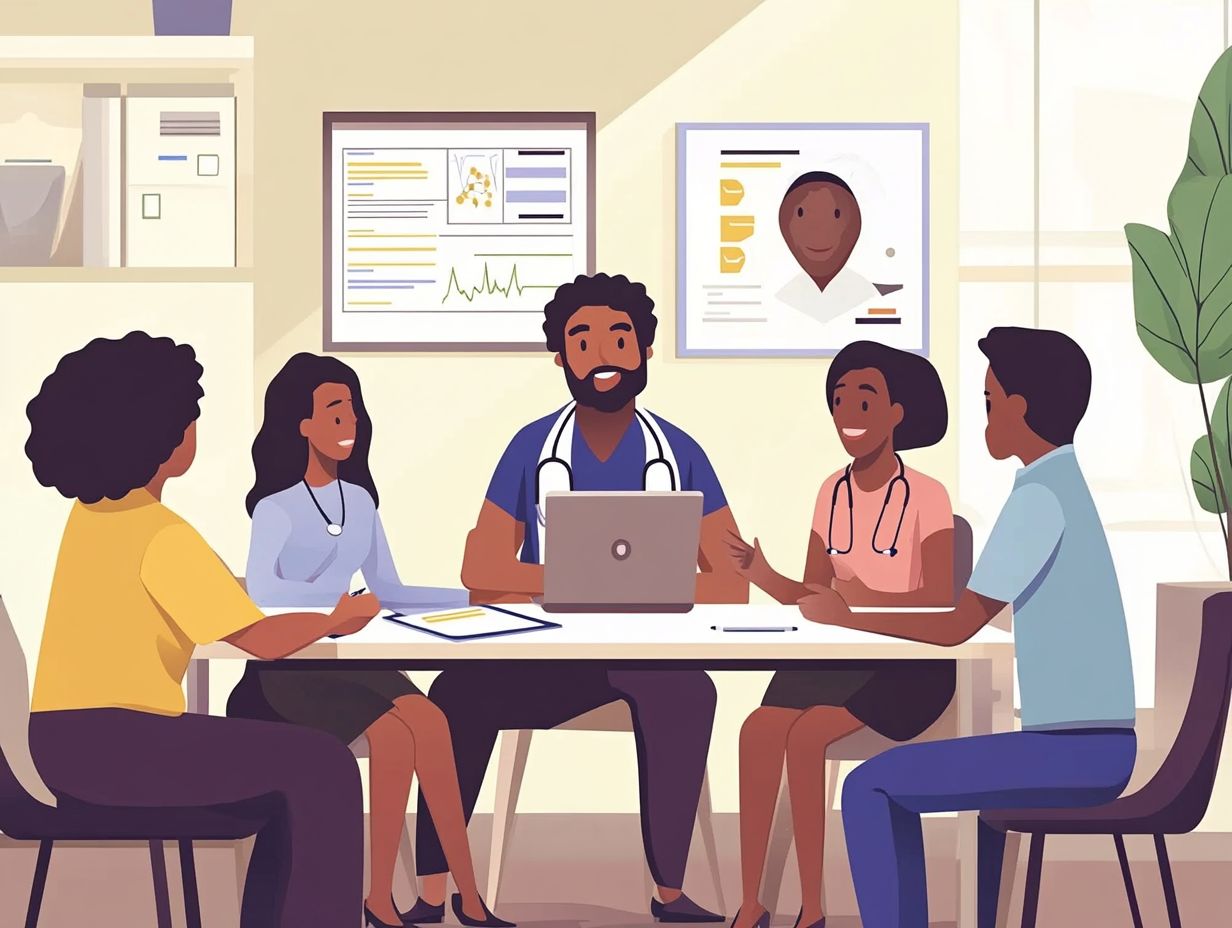What Should You Discuss with Your Practitioner?
Visiting a doctor can often feel intimidating, but being thoroughly prepared can transform your experience and enhance your outcomes.
This guide outlines the essential steps to take before your appointment, such as crafting the right questions and clearly communicating your symptoms.
You ll discover how to share your medical history effectively, grasp your diagnosis, explore treatment options, and understand what to expect for follow-up care.
Equip yourself with the knowledge necessary for a productive visit. This will empower you to take charge of your health journey.
Contents
- Key Takeaways:
- Preparing for a Doctor’s Visit
- Discussing Your Symptoms
- Sharing Your Medical History
- Understanding Your Diagnosis
- Treatment Options
- Follow-Up Care
- Frequently Asked Questions
- What should you discuss with your doctor before starting a new medication?
- What should you discuss with your doctor during a routine check-up?
- What should you discuss with your doctor if you are pregnant or planning to become pregnant?
- What should you discuss with your doctor before undergoing surgery?
- What should you discuss with your doctor if you are experiencing mental health concerns?
- What should you discuss with your doctor if you are considering alternative or complementary therapies?
Key Takeaways:

Before your doctor’s visit, ask yourself questions about your symptoms. Make a list of questions and concerns to ensure you don t miss anything important during your visit!
Communicate effectively with your practitioner by being honest and clear. Ask questions to fully understand your diagnosis and treatment options.
Share your complete medical history, including any current medications and past conditions. This ensures accurate treatment and follow-up care.
Preparing for a Doctor’s Visit
Preparing for a doctor’s visit is crucial for ensuring that you receive care that is truly personalized to your health concerns.
Whether you’re heading to a primary care physician for a routine checkup or addressing specific health issues, taking the time to prepare can greatly enhance your relationship with your doctor.
Use online resources, such as a patient portal, to access your medical records beforehand. This can streamline the entire process and foster better communication.
Take a moment to reflect on any lifestyle changes and relevant family medical history. This can provide your healthcare provider with valuable insights into potential health risks.
Questions to Ask Yourself Beforehand
Before your doctor visit, engage in thoughtful reflection on healthcare questions that can elevate the effectiveness of your appointment.
Consider various health concerns that merit attention or discussion during your visit. What specific health goals do you aspire to achieve in the coming months?
It may also be valuable to evaluate any significant lifestyle changes you ve made since your last appointment.
Have you encountered any new symptoms or challenges, particularly related to chronic conditions that could impact your daily life?
By dedicating time to explore these areas, you can foster a more productive and enriching dialogue with your healthcare provider.
Discussing Your Symptoms
When you discuss your symptoms during a visit to the doctor, effective communication becomes essential.
This ensures that your healthcare provider can accurately assess your condition and recommend the most appropriate care for you.
Effective Communication with Your Practitioner
Effective communication with your practitioner is vital for building a strong relationship with your doctor.
To elevate this essential interaction, prioritize active listening during your appointments. This practice allows you to fully grasp your practitioner’s insights.
When uncertainties emerge, don’t hesitate to ask clarifying questions. Making sure you re both aligned is key.
You should feel enabled to openly share your emotional state. This transparency helps healthcare providers understand the complete picture of your health.
Articulating your health concerns accurately paves the way for better diagnoses. It also opens avenues for more tailored treatment options, fostering a more collaborative healthcare experience.
Sharing Your Medical History

Sharing your medical history with your healthcare provider is essential during your doctor visit.
It serves as the cornerstone for personalized care and the development of effective treatment plans tailored specifically to your needs.
When sharing your medical history, provide essential information that enhances your healthcare provider s understanding of your health status.
Detail your current medications. This helps identify potential drug interactions or side effects that could influence your treatment plans.
Don t overlook previous surgeries; they can reveal underlying conditions that impact your current health assessments.
Chronic conditions like diabetes or hypertension are critical. They often require tailored screening to ensure effective management of your overall wellness.
Sharing your family medical history can indicate predispositions to certain diseases. This allows for proactive measures to be taken.
By providing this complete picture, you enable more effective health screenings and personalized treatment strategies.
Understanding Your Diagnosis
Understanding your diagnosis is key to managing your health effectively. It allows you to engage meaningfully with your healthcare provider about treatment options.
This fosters a collaborative relationship that enhances your overall care.
Clarifying Any Confusion
Clarifying any confusion about your diagnosis with your healthcare provider boosts your emotional well-being and overall health outcomes.
Understanding your condition goes beyond awareness; it s about feeling empowered in your recovery journey.
Feel encouraged to ask questions about unclear terms or concepts. This communication enriches your knowledge and strengthens your relationship with your provider.
Treatment Options
Explore treatment options with your healthcare provider to effectively manage your health. This is particularly important when dealing with chronic conditions.
Engaging in this dialogue helps you make informed choices tailored to your needs.
Exploring Different Treatment Plans

Exploring various treatment plans is crucial for managing your chronic disease. This journey often blends dietary guidelines and exercise routines.
Your health conditions and lifestyle choices greatly impact this process. Collaborating with healthcare providers is essential for crafting personalized strategies.
By addressing nutrition, physical activity, and medication use, a comprehensive treatment plan empowers you to take charge of your wellness.
Follow-Up Care
Follow-up care is vital for managing your health. It ensures that ongoing concerns are addressed effectively.
Prioritize these visits to stay informed and proactive about your well-being.
What to Expect After Your Visit
After your visit, understand what to expect regarding follow-up care. This may include lab results that clarify your health status.
It s important to explore any lifestyle changes that may enhance your well-being. Staying proactive about your emotional health is essential during this journey.
Frequently Asked Questions
What should you discuss with your doctor before starting a new medication?
Make sure to discuss your medical history, current medications, and any allergies with your doctor before starting a new medication.
Your doctor can also provide information about potential side effects and any necessary precautions for taking the new medication.
What should you discuss with your doctor during a routine check-up?

During a routine check-up, discuss any changes in your health or lifestyle.
Tell your doctor about any new symptoms or concerns and any medications you are currently taking.
This will help your doctor assess your overall health and make necessary adjustments to your care plan.
What should you discuss with your doctor if you are pregnant or planning to become pregnant?
If you are pregnant or planning to become pregnant, talk to your doctor about your pregnancy plans.
Your doctor can provide information about potential risks or precautions for your health and your baby’s health.
They can also discuss any necessary adjustments to your medication or treatment plan.
What should you discuss with your doctor before undergoing surgery?
Before surgery, discuss your medical history, current medications, and any allergies with your doctor.
Your doctor will provide information about the procedure, potential risks and complications, and any necessary preparations or precautions to take.
What should you discuss with your doctor if you are experiencing mental health concerns?
If you are experiencing mental health concerns, discuss your symptoms with your doctor.
They can provide a proper diagnosis and recommend treatment options, such as therapy or medication, to help manage your mental health.
What should you discuss with your doctor if you are considering alternative or complementary therapies?
If you are considering alternative or complementary therapies, such as herbal remedies or acupuncture, talk to your doctor.
They can provide information about potential benefits and risks and any possible interactions with your current treatment plan.






